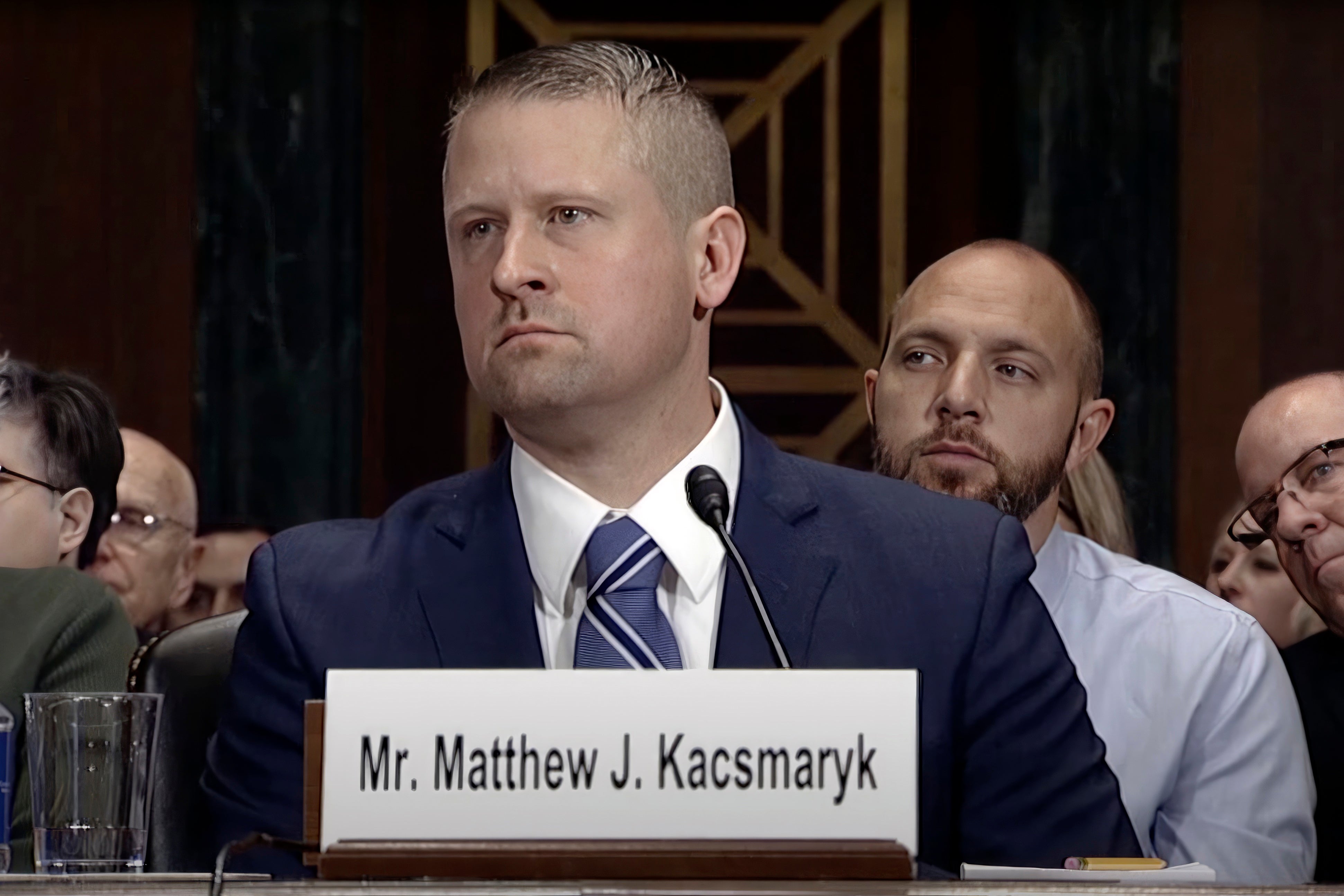
The decision by a Trump-appointed Texas judge to halt approval of the most-commonly used abortion pill in the United States is being described as the most significant blow to the pro-choice movement since the Supreme Court overturned Roe v Wade last year.
US District Judge Matthew Kacsmaryk ordered a hold on the federal Food and Drug Administration (FDA) approval of Mifepristone on Friday, in a decision that upended decades of precedent.
Minutes after the 67-page ruling was released, a judge in Washington state issued a decision directing authorities not to restrict access to the drug in 17 states where Democrats have sued to protect the drug’s availability.
The Biden administration has also appealed the decision.
Judge Kacsmaryk, who was appointed to a lifelong spot on the federal judiciary by former president Donald Trump, has a history of right-wing activism from the bench.
Here’s what to know about Matthew Kacsmaryk.
Who is Matthew Kacsmaryk?
Born in Gainesville, Florida, in 1977, Judge Kacsmaryk worked as an Assistant US Attorney and deputy general counsel for the religious freedom firm, First Liberty Institute, prior to his appointment to the federal bench.
The 45-year-old was also a longstanding member of the Federalist Society, a right-wing legal organisation which was highly influential in shaping Mr Trump’s judicial nominees.
A devout Christian, Judge Kacsmaryk had voiced his opposition to same-sex marriage and anti-discrimination protections while rising through the ranks of Republican activists in Texas.

He called abortion rights supporters “sexual revolutionaries” in a 2015 article that criticized Roe v Wade, the landmark legislation overturned by the Supreme Court last year.
While working at the First Liberty Institute, Judge Kacsmaryk also helped oppose a federal mandate for employer-provided health insurance to cover women’s birth control.
He has called homosexuality “disordered”, and referred to being transgender as “delusional”.
His nomination to the federal judgeship in 2017 drew widespread condemnation from Democrats, LGBTQ activists and pro-choice advocates.
The appointment process dragged on for two years in the US Senate, before he was confirmed in a contentious 52-46 vote in June 2019.
Republican Senator Susan Collins opposed his confirmation and warned about his “alarming bias against LGBTQ Americans and disregard for Supreme Court precedents,” in a 2019 statement to the Washington Post.
“Mr Kacsmaryk has dismissed proponents of reproductive choice as ‘sexual revolutionaries,’ and disdainfully criticized the legal foundations of Roe v. Wade,” Ms Collins said in 2019.
“Such extreme statements reflect poorly on Mr Kacsmaryk’s temperament and suggest an inability to respect precedent and to apply the law fairly and impartially.”

Judge Kacsmaryk revealed in his Senate questionnaire that he was a member of the Red Mass Committee for the Roman Catholic diocese of Fort Worth.
According to the diocese’s website, the Red Mass is a Catholic tradition that dates back to the 13th Century and encourages the “involvement of the legal community in spreading the Word of God”.
He was also a board member on the Christian Homes & Family Services, which provides housing and adoption services to women with unplanned pregnancies, at the time of his judicial appointment.
He and wife Shelly Kacsmaryk have five children. Their first baby, a girl named Tyndale, was stillborn.
The chief executive of Christian Homes & Family Services Sherri Statler told the New York Times that the experience of having a stillborn child had strongly shaped Judge Kacsmaryk’s views on abortion.
“I think that contributed to his interest in wanting to support women in all kinds of ways, but most especially when they are pregnant,” Ms Statler said.
‘Judge-shopping’
Since Judge Kacsmaryk’s appointment to the bench in Amarillo, Texas, Republicans and conservative activists have repeatedly filed controversial lawsuits in his district.
The Department of Justice has launched legal appeals against what it calls “judge-shopping”; the deliberate filing of cases in a district that will ensure favourable judges hear them.
The Justice Department has unsuccessfully sought to have several cases transferred out of Kacsmaryk’s district.
These include a case challenging a Labor Department policy that allows retirement-plan finance managers to consider climate change in investment decisions.

It also lost an appeal to transfer a lawsuit challenging the Biden adminstration’s immigration parole programme out of the Amarillo district. The plan would grant 360,000 people from Cuba, Haiti, Nicaragua and Venezuela the right to come to the US for two years.
Judge Kacsmaryk is overseeing several cases with far-reaching national implications, and has already become a thorn in the side of the Biden administration.
In October last year, he issued a ruling that said federal requirements for employers to provide protections for LGBTQ employees went too far.
Reuters reported that anti-abortion groups filed their lawsuit last November challenging FDA approval of Mifepristone in Amarillo, guaranteeing the case would be heard by Judge Kacsmaryk.
In his ruling, delivered on Good Friday, Judge Kacsmaryk used language pulled directly from anti-abortion activists, including referring to abortion providers as “abortionists” and a fetus as an “unborn human”.
Widespread condemnation
President Joe Biden condemned the Texas decision as “the next big step toward the national ban on abortion that Republican elected officials have vowed to make law in America”.
“If this ruling were to stand, then there will be virtually no prescription, approved by the FDA, that would be safe from these kinds of political, ideological attacks,” he said in a statement.
“The lawsuit, and this ruling, is another unprecedented step in taking away basic freedoms from women and putting their health at risk,” the president added.
Vice President Kamala Harris said the decision not only “threatens the rights of women nationwide to make decisions about their health care” but also “undermines the FDA’s ability to approve safe and effective medications” with decisions based on politics, not science.

“This lawsuit was manufactured as part of an orchestrated campaign to deny all women in the US access to abortion, even those living in states with strong abortion rights protections,” Nancy Northup, president and CEO at the Center for Reproductive Rights, said in a statement.
“It’s abundantly clear that those who rely on a fact-based, scientific FDA drug approval process, including major pharmaceutical companies, need to speak out about the travesty of this case.”
Planned Parenthood’s president and CEO Alexis McGill Johnson stressed that “access to mifepristone remains safe for now.”
The American Medical Association said Judge Kacsmaryk’s decision “flies in the face of science and evidence.”
“The court’s disregard for well-established scientific facts in favor of speculative allegations and ideological assertions will cause harm to our patients and undermines the health of the nation,” Dr Jack Resneck, the group’s president, said in a statement.
“By rejecting medical facts, the court has intruded into the exam room and has intervened in decisions that belong to patients and physicians.”
What is Mifepristone?
Mifepristone is one of a two-drug protocol for medication abortion, a procedure that accounts for more than half of abortions nationwide.
The drug was approved for use in 2000 by the FDA in most cases up to 10 weeks of pregnancy. Multiple studies have determined they are overwhelmingly safe and effective, and have been used in roughly 54 per cent of all abortions.
A vast majority of abortions occur within the first nine weeks. In 2019, nearly 93 per cent of all abortions were performed before the 13th week.
Abortion rights advocates say that providers could rely on a misoprostol-only regimen for medication abortion if mifepristone is not available.







